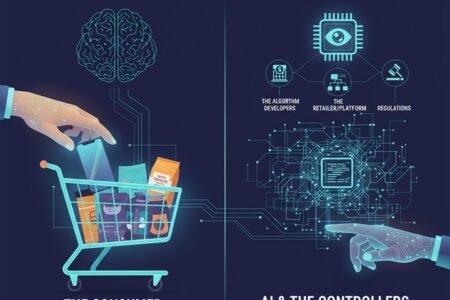
Role Of AI And Digital Transformation in The Retail and E-Commerce Sector in Saudi Arabia
In Saudi Arabia, Digital Transformation and Artificial Intelligence are vital to the future of both the retail and e-commerce sectors. Advancements in these technologies are a priority for Saudi markets, thanks to the Saudi Vision 2030.
According to International Trade Administration, Saudi Arabia’s digital transformation centers on a series of government- led programs and initiatives strategically aligned with Vision 2030, The Ministry of Communications and Information Technology (MCIT) has been instrumental in spearheading these efforts, aiming to create a world-class digital infrastructure that supports the Kingdom’s broader economic goals.
One of the most significant initiatives was the formation of the Saudi Data and Artificial Intelligence Authority (SDAIA), which was established as the national data protection enforcement authority and to oversee the Kingdom’s artificial intelligence, strategy This strategy aims to position Saudi Arabia as a global leader in artificial intelligence by 2030, with a focus on leveraging AI to drive innovation and economic growth across varied sectors.
In the Kingdom’s retail and e-commerce market, digital transformation primarily focuses on utilizing technology to enhance customer experiences, optimize operations, and foster growth.
Digital Transformation helps retailers remain competitive and maintain relevance in a constantly evolving market. In retail, digital transformation involves incorporating technology into a retailer’s operations system, and processes to enhance the customers experience, improve operational efficiency, and foster growth.
The Key Elements of Retail Digital Transformation are as follows:
- Omnichannel Shopping- Omnichannel shopping entails retailers combining their physical and digital channels to offer a smooth shopping experience across all platforms. In the modern day, shoppers use an average of six touchpoints when evaluating a purchase, researching, and comparing products before making a decision.
- Data Analytics- Data is the foundation of decision making. The right data is important for retail operations and for customers to choose the right product. Retailers must leverage data analytics to understand consumer behaviours and preferences. This will guide operational decisions on what products to offer, how to sell them, and who to target, while also enabling a personalized shopping experience for customers.
For employees, having real-time access to inventory and customer data can enhance daily operations and improve customer service and experience.
- Contactless Checkout- Contactless checkout plays a key role in digital transformation, especially in the retail sector, providing quicker, more convenient, and often safer payment and transaction options. Customers can complete their transactions without physically interacting with cash, cards or traditional checkout lanes, often using mobile devices or self-checkout kiosks.
- Inventory Management
- Product Management
Digital transformation in the retail industry improves customer loyalty, reduces inefficiencies, and allows retailers to streamline their supply chain operations such as sourcing, inventory control and delivery. It can also support retail workers.
According to a report from Scandit, the examples of digital transformation in retail are as follows, Artificial Intelligence, Data Capture, Augmented Reality, Customer Apps, and Worker devices.
Artificial Intelligence has reshaped the retail industry. This technological. advancement has not only led to substantial profits but has also enhanced personalized customer interactions, optimized supply chain operations, and streamlined processes. It has fostered data-driven decision-making through tailored recommendations, efficient inventory control, and improved customer service. Crucial investments are being made towards Artificial Intelligence to reshape the economic landscape and support the Kingdom’s strategies for gaining a competitive edge in the global AI scene.
Applications of Artificial Intelligence in the retail sector are:
- Personalization- AI examines customer data to deliver personalized recommendations, enhancing the shopping experience and boosting conversion rates.
- Inventory Management- AI algorithms forecast demand, optimize inventory levels and automate reordering processes, reducing waste and ensuring product availability.
- Customer Service- AI-powered chatbots and virtual assistants provide immediate support and information, enhancing customer satisfaction and lowering operational costs.
- Fraud Detection- AI systems analyse transactions for any irregular patterns, helping retailers to identify and stop fraudulent activities in real time.
Artificial Intelligence technologies relevant to the retail sector, are as follows:
- Predictive Analytics- Retailers can utilize predictive analytics to project sales, understand customer turnover and optimize marketing strategies allowing them to make data driven decisions.
- Recommendation System- This utilizes AI algorithms to examine the customers behaviour and preferences, offering tailored product suggestions. By drawing on data from various sources, such as purchase history and browsing activity, recommendation systems can improve the shopping experience and increase sales.
- Supply chain Optimization – AI can examine data throughout the supply chain to pinpoint inefficiencies, streamline logistics and cut down on expenses.
- Pricing Optimization- AI can access competitor prices, demand trends, and various other factors to develop optimal pricing strategies that maximize revenue.
Artificial Intelligence can also help retailers collect data, such as purchase history, customers browsing pattern, and social media interaction. Additionally, Artificial Intelligence enhances customer engagement through chatbots and virtual assistants, customer sentiment analysis and an omnichannel experience. With the help of Artificial Intelligence, retailers can boost their sales through inventory management, targeted marketing campaigns and fraud detection and prevention.
According to the International Trade Administration, the e-commerce sector is also a vital component of Saudi Arabia’s digital economy, driven by the country’s young, tech-savvy population and high internet penetration rates.
In Saudi Arabia, from an e-commerce perspective digital transformation plays a key role in Vision 2030, aiming to build a dynamic and thriving digital economy. The Kingdom is making significant investments in digital infrastructure and fostering innovation to attract international investment. Projects such as NEOM and the Red Sea project are examples of smart city initiatives that incorporate cutting-edge technologies. According to Statista, the number of e-commerce users is expected to reach 34.5 million by 2025, with user penetration expected to reach 74.7% by 2027.
The digital transformation in the Kingdom of Saudi Arabia is being driven by the adoption of Internet of Things (IoT) technologies. This adoption helps in collecting data and conducting analysis at a fast pace, leading to advancements in operational efficiency and productivity across various sectors.
Artificial Intelligence is reshaping the Saudi e-commerce sector. With the rapid growth of the e-commerce market in Saudi Arabia, AI is emerging as a crucial force for innovation, enhancing everything from customer experiences to logistics.
Artificial Intelligence in e-commerce can analyse consumers behaviour, shopping preferences, purchase history, tailoring products to suit the consumer’s taste. E-commerce platforms like Noon and Jarir are making use of AI to create engaging and personalized shopping experience, which is known to boost sales. Machine learning models assist e-commerce business in forecasting which product a customer is likely to buy, enhancing the shopping experience to be smoother and more intuitive. AI is also improving customer support with the use of chatbots and virtual assistants. These tools provide instant customer support, handling inquiries, resolving issues and assisting shoppers throughout their buying process. As Saudi consumers seek quicker and more responsive service, AI-powered support systems are enabling businesses to meet these demands effectively.
AI also plays a vital role in optimizing the supply chain within Saudi Arabia’s e-commerce sector. By utilizing AI-powered analytics, businesses can predict demand, manage inventory more efficiently, and optimize delivery routes, leading to cost reductions and faster delivery times.
As Saudi Arabia advances with Vision 2030 and the expansion of the digital economy, the influence of AI in e-commerce is set to increase. By enhancing operations and customer engagement, AI is helping Saudi e-commerce businesses maintain a competitive edge in a rapidly evolving market.
In conclusion, Saudi Arabia’s digital transformation, fueled by Vision 2030, is reshaping the retail and e-commerce sectors, with Artificial Intelligence playing a pivotal role. By enhancing customer experiences, streamlining operations, and optimizing supply chains, AI helps businesses remain competitive. As the digital economy grows, AI will continue to be essential for innovation and economic advancement.








